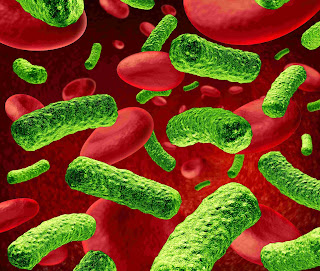20 Latest BACTERIA Questions and Answers
1. All the bacteria fix nitrogen except
A. Rhizobium
B. E.coli
C. Azotobacter
D. cyanobacteria
Ans: B
2. Differential staining of bacteria on Gram staining is due to
A. difference in the cell wall layer components of Gram positive and Gram negative bacteria
B. difference in the cell structure of Gram positive and Gram negative bacteria
C. difference in the mode of nutrition of Gram positive and Gram negative bacteria
D. none of the above
Ans: A
3. The iodine used in Gram staining serves as a
A. chelator
B. catalyst
C. mordant
D. cofactor
Ans: C
4. Which among the following is called as filamentous bacteria
A. Mycoplasmas
B. Spirochetes
C. Actinomycetes
D. Vibrios
Ans: C
5. Which of the following group of bacteria is considered as a link between bacteria and virus
A. Mycoplasmas
B. Spirochaetes
C. Actinomycetes
D. Vibrios
Ans: A
6. Cork-screw shaped forms of bacteria are
A. bacilli
B. stalked bacteria
C. spirochaetes
D. actinomycetes
Ans: C
7. The ability of bacteria to change their morphological form frequently is termed as
A. lysogeny
B. pleomorphism
C. alteromorphism
D. none of these
Ans: B
8. Bacterial cell wall is made up of
A. chitin
B. cellulose
C. dextran
D. peptidoglycan
Ans: D
9. Bacterial flagella is made up of
A. microtubules
B. tubulin
C. flagellin
D. spinin
Ans: C
10. Surface appendage of bacteria meant for cell-cell attachment during conjugation is
A. pili
B. flagella
C. spinae
D. cilia
Ans: A
11. Spinae is rigid tubular appendages in
A. Gram positive bacteria
B. Gram negative bacteria
C. both a and b
D. actinomycetes
Ans: A
12. The region where bacterial genome resides is termed as
A. nucleus
B. cytoplasm
C. nucleoid
D. ribosome free region
Ans: C
13. Bacterial chromosome is
A. single stranded and circular
B. double stranded and circular
C. single stranded and linear
D. double stranded and linear
Ans: B
14. Extra chromosomal, circular, double stranded, self-replicating DNA molecule in bacteria is called
A. cosmid
B. plasmid
C. phagemid
D. phasmid
Ans: B
15. Membraneous infolding in bacteria that initiate DNA replication is
A. mesosomes
B. carboxysome
C. magnetosome
D. nulcleosome
Ans: A
16. Which of the following is/are not a gram-positive bacteria?
A. Streptococci
B. Pseudomonas
C. Mycobacteria
D. None of these
ANSWER: B
17. Gram-positive bacteria, responsible for food poisoning, is/are
A. Mycoplasmas
B. Pseudomonas
C. Clostridia
D. all of these
ANSWER: C
18. The gram-positive bacteria lack __________ structure/component?
A. outer membrane
B. murein
C. teichoic acid
D. plasma membrane
ANSWER: A
19. Which of the following gram-positive bacteria causes pharyngitis (sore throat)?
A. Neisseria
B. Streptococcus
C. Staphylococcus
D. Mycobacterium
ANSWER: B
20. Which of the following gram-negative bacteria is/are not aerobic?
A. Pseudomonas
B. Neisseria
C. Escherichia
D. None of these
ANSWER: C
1. All the bacteria fix nitrogen except
A. Rhizobium
B. E.coli
C. Azotobacter
D. cyanobacteria
Ans: B
2. Differential staining of bacteria on Gram staining is due to
A. difference in the cell wall layer components of Gram positive and Gram negative bacteria
B. difference in the cell structure of Gram positive and Gram negative bacteria
C. difference in the mode of nutrition of Gram positive and Gram negative bacteria
D. none of the above
Ans: A
3. The iodine used in Gram staining serves as a
A. chelator
B. catalyst
C. mordant
D. cofactor
Ans: C
4. Which among the following is called as filamentous bacteria
A. Mycoplasmas
B. Spirochetes
C. Actinomycetes
D. Vibrios
Ans: C
5. Which of the following group of bacteria is considered as a link between bacteria and virus
A. Mycoplasmas
B. Spirochaetes
C. Actinomycetes
D. Vibrios
Ans: A
6. Cork-screw shaped forms of bacteria are
A. bacilli
B. stalked bacteria
C. spirochaetes
D. actinomycetes
Ans: C
7. The ability of bacteria to change their morphological form frequently is termed as
A. lysogeny
B. pleomorphism
C. alteromorphism
D. none of these
Ans: B
8. Bacterial cell wall is made up of
A. chitin
B. cellulose
C. dextran
D. peptidoglycan
Ans: D
9. Bacterial flagella is made up of
A. microtubules
B. tubulin
C. flagellin
D. spinin
Ans: C
10. Surface appendage of bacteria meant for cell-cell attachment during conjugation is
A. pili
B. flagella
C. spinae
D. cilia
Ans: A
11. Spinae is rigid tubular appendages in
A. Gram positive bacteria
B. Gram negative bacteria
C. both a and b
D. actinomycetes
Ans: A
12. The region where bacterial genome resides is termed as
A. nucleus
B. cytoplasm
C. nucleoid
D. ribosome free region
Ans: C
13. Bacterial chromosome is
A. single stranded and circular
B. double stranded and circular
C. single stranded and linear
D. double stranded and linear
Ans: B
14. Extra chromosomal, circular, double stranded, self-replicating DNA molecule in bacteria is called
A. cosmid
B. plasmid
C. phagemid
D. phasmid
Ans: B
15. Membraneous infolding in bacteria that initiate DNA replication is
A. mesosomes
B. carboxysome
C. magnetosome
D. nulcleosome
Ans: A
16. Which of the following is/are not a gram-positive bacteria?
A. Streptococci
B. Pseudomonas
C. Mycobacteria
D. None of these
ANSWER: B
17. Gram-positive bacteria, responsible for food poisoning, is/are
A. Mycoplasmas
B. Pseudomonas
C. Clostridia
D. all of these
ANSWER: C
18. The gram-positive bacteria lack __________ structure/component?
A. outer membrane
B. murein
C. teichoic acid
D. plasma membrane
ANSWER: A
19. Which of the following gram-positive bacteria causes pharyngitis (sore throat)?
A. Neisseria
B. Streptococcus
C. Staphylococcus
D. Mycobacterium
ANSWER: B
20. Which of the following gram-negative bacteria is/are not aerobic?
A. Pseudomonas
B. Neisseria
C. Escherichia
D. None of these
ANSWER: C

No comments:
Post a Comment